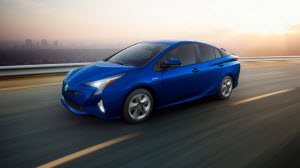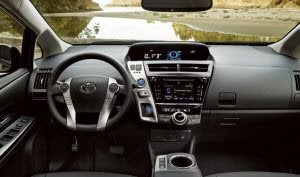Toyota Prius vs. Honda Fit
One of the most important factors that drivers in the Daytona Beach, Palm Coast, and Ormond Beach area consider when browsing for their next car is fuel efficiency. Most drivers prefer the Toyota Prius as their efficient vehicle. However, drivers who haven’t yet made the jump to hybrid/electric find the Honda Fit a worthy substitute. When you’re looking for your next efficient vehicle, which one do you ultimately go with?
Our team at Daytona Toyota is going to look closer at the 2017 Toyota Prius and Honda Fit. In our Toyota Prius vs. Honda Fit comparison, we’re going to examine and compare each vehicle’s fuel efficiency, featured amenities and technology, and the safety features. Reading this Toyota Prius vs. Honda Fit comparison will help you determine which vehicle is more your style.
Toyota Prius vs. Honda Fit: Fuel Efficiency
The 2017 Toyota Prius is equipped with a 1.8L four-cylinder hybrid engine and a sealed nickel-metal hydride battery. Helping the driver control the engine is the electronic CVT (continuously variable transmission). The Honda Fit is equipped with a 1.5L four-cylinder engine and a six-speed manual transmission.
When it comes to their abilities, each vehicle shares a common horsepower and torque output, but in terms of their respective efficiencies, there’s quite a difference. It’s obvious that the 2017 Toyota Prius and its EPA estimated 54/50 mpg city/highway* take the lead. The Honda Fit only gets 29/36 mpg city/highway.

Featured Amenities & Technology
Both of these vehicles are equipped with a dashboard-mounted touchscreens that allow the driver to access their respective radio and CD player. The Toyota Prius features a 6.1-inch high-resolution screen and the Honda Fit features a five-inch LCD screen. However, the Toyota Prius comes with advanced voice recognition, which allows you to easily access your media or phonebook contacts by using your voice and keeping your hands firmly on the wheel. In terms of audio delivery, the Toyota Prius features six speakers and the Honda Fit is equipped with four speakers.
Safety Features
Each vehicle is equipped with the necessary stability and traction control systems, which aid the driver while crossing slippery terrain. During an instance of traction loss, these systems will apply brake pressure to the slipping wheel while sending more torque to the other wheels in an effort to keep the vehicle on its intended path. Both of these vehicles even features advanced airbag systems to provide crucial passenger protection.
While the safety features seem similar, the Toyota Prius has another trick up its sleeve with the Toyota Safety Sense™ P. This feature provides driver-assisting technology systems at the base level. These features include a pre-collision system, lane departure alert, auto high beams, and full-speed dynamic radar cruise control. The Honda Fit only offers the Honda LaneWatch™, which requires an upgrade.
Toyota Prius vs. Honda Fit: Choosing the Right Vehicle
In this Toyota Prius vs. Honda Fit comparison, our team at Daytona Toyota provided you with a great deal of information about the 2017 Toyota Prius and the 2017 Honda Fit. However, you saw that the Toyota Prius offers more in each of our specific categories. Why not learn more about the Toyota Prius by taking it for a spin?
Schedule your test drive with us at Daytona Toyota, the dealership that proudly serves drivers in the Daytona Beach, Palm Coast, and Ormond Beach area.
*2016 EPA-estimated 54 city/50 highway/52 combined mpg for Prius. Actual mileage will vary.




